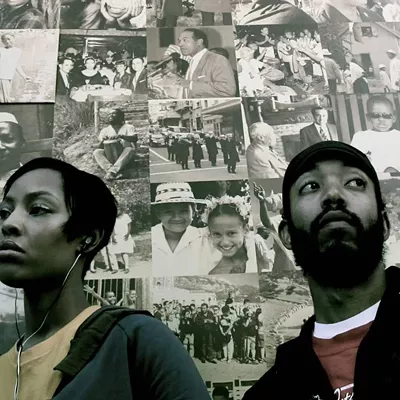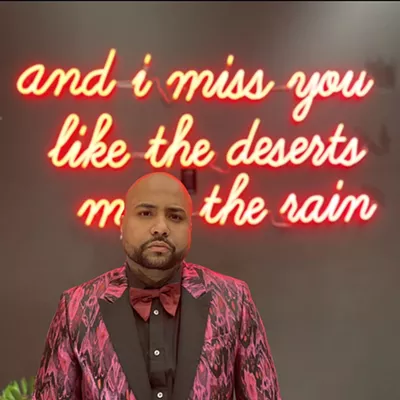"I've been called worse, Stephen, believe me," he retorts.
He's been called suave, debonair, sexy, swaggering and cool, but he's also been called an asshole. He has a self-admitted "reputation" that precedes him. But before you judge Greg Dulli, you should know that he's undergone some remarkable changes over the last few years that have helped to reshape and redefine him, to make him a new--and, yes, improved--man. And it is that Greg Dulli--far more kind, funny, generous and warmhearted than anyone might expect--who's on the other end of the phone.
Dulli began his musical career as the singer, primary songwriter and guitarist for the Cincinnati-based Afghan Whigs, whose first couple albums and a handful of EPs were released on Sub Pop (save for their self-released debut album), before they inked deals with Elektra and Columbia for their last three full-lengths. Though they resided on Sub Pop during its initial "grunge" heyday, the Whigs never fit the mold of the sludgy stuff churned out by contemporaries such as Mudhoney, Tad and Nirvana. Instead, they embraced their unclassifiable status by merging whinnying slide guitar with melodic power-chords, bobbing bass lines with inventively busy drumming, and integrating it all with elements of Motown-era soul. Over it all, Dulli's voice alternated between an impassioned croon and a tormented belt, recounting tales of lust, betrayal, self-loathing and just about any other type of angst one can imagine.
On a spell of downtime for the band, when they were between labels, Dulli recorded an album with friends and session musicians called Twilight as Played by the Twilight Singers. But after the Afghan Whigs signed with Columbia, the label urged him to hold off on releasing it until after the Whigs' Columbia release, 1998's 1965, came out. 1965 would prove to be the band's last album.
"I think it had reached its logical conclusion," Dulli says of the breakup. "I think you know it, just like you know it in a personal relationship. I think it's probably the same reason people get divorced, break up, move out of houses--it has gone as far as it can go. And sooner or later, the pony wants to break free and try other pastures." It didn't make matters any easier that, by that point, the band's four members were each living in different cities, spread across three time zones.
With the Afghan Whigs relegated to the past, Dulli revisited the Twilight Singers album, retooling it with the help of British electronica duo Fila Brazilia. When it was finally released in 2000, Whigs fans were jarred by what they heard: ambient, late-night, soulful, folkish songs that employed acoustic guitars, piano and strings, backed by electronic drum beats, and featuring a number of vocalists. The pony had indeed found new pastures.
The album served as a template of sorts for what the Twilight Singers would continue to be, not in sound, but in theory: malleable. Each subsequent Twilight Singers album has included a different roster.
"I think I have always had an immense curiosity about other things," Dulli explains, "... I've met so many talented people throughout the last 20 years, and I've moved around so much, that I think I just wanted to see what I sounded like with somebody else. And then after that, what I sounded like with this other person. So it became this kind of--I'm not gonna say schizophrenic--but, uh, polygamist way of working, you know what I mean?"
That polygamist way of working has rounded up some unlikely collaborators. 2003's vaguely psychedelic Blackberry Belle, which stepped up the tempo of its predecessor, included appearances from blues guitarist Alvin Youngblood Hart, Galactic drummer Stanton Moore, that dog veteran and multi-instrumentalist Petra Haden, former Screaming Trees vocalist Mark Lanegan (who has appeared on the Singers' subsequent two albums and is a member of the current touring band) and onetime Prince muse Apollonia Kotero.
2004's She Loves You showcases one of the components that have endured throughout Dulli's career: his love for and strength in reinterpreting cover songs. But perhaps more importantly, during its making, Dulli found the inspiration to leave behind his longtime drug abuse.
"I felt like I was dying," he says. "I didn't recognize myself physically or emotionally anymore. I was hurting people left and right. And I think I had the elusive moment of clarity. And once I put a month between myself and drugs, there was no turning back. The last time I did class-A felony drugs was March 10, 2004. ... I went cold turkey, bro. I'm such a stubborn, pigheaded Taurus that once I make up my mind, I have tremendous willpower. Lightning struck, and I was like, 'Wow, that's it. That is it. The end.'"
Being clean would provide fodder for the latest Twilight Singers full-length, this year's relatively hard-rocking Powder Burns--along with another life-changing event.
Dulli lives part-time in Los Angeles, and part-time in New Orleans. He returned early from Milan, where he was on tour with Italian band Afterhours when Katrina hit. Unable to return to New Orleans, he stayed in Brooklyn, where he was joined by Powder Burns co-producer Mike Napolitano. The day the New Orleans airport reopened, the pair flew back to the Big Easy. For a week or so, they helped out friends. "And then probably the eighth day back there, we started to work on the record," he says. "And the power kept going on and off, so we had some generators, and it was surreal, probably like in a siege mentality. ... I had no choice (but to resume recording), with what I was witnessing. Going down into the places where there was 20 feet of water, the trees were dead, the animals were dead, there were no birds. ... Man, you would have to be a closed-off motherfucker not to be massively changed by your surroundings.
"I started to see a parallel between myself and my former demons, and what was happening in the city at the time, and I began to kind of draw the lines together. I'll never forget this record for that. ... I'll never be who I was because of those events."
















